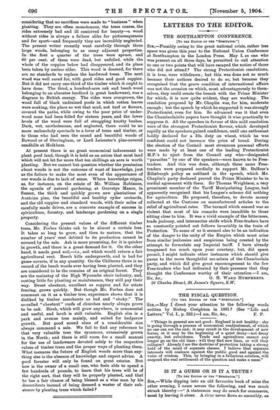[To THE EDITOR OF THE "SPECTATOR."]
SIR,—Possibly owing to the great national crisis, rather less space was given this year to the National Union Conference at Southampton in the London Press. May I, as one who was present on all three days, be permitted to call attention to one or two points that will have escaped the notice of those who did not attend? The strong Protectionist resolutions, it is true; were withdrawn ; but this was done not so much because their authors desired to do so, but because they recognised that the grave condition of international affairs was not the occasion on which, most advantageously to them- selves, they could create the breach with the Prime Minister • for which, it is now quite evident, they are working. The resolution proposed by Mr. Chaplin was, for him, moderate enough ; but the speech by which he supported it was strongly Protectionist, even for him. So advanced was it that even the Chamberlainite papers have thought it wise practically to suppress it. All the speeches in favour of this mild resolution were of the strongest Protectionist flavour, which developed rapidly as the speakers gained confidence, until one enthusiast boldly declared for a 10s. duty on wheat, which he was confident could not increase the price of bread. During the election of the Council most strenuous personal efforts were made by at least one of the leading Protectionist M.P.'s to eject from the Council any who—designated " parasites " by one of the speakers—were known to be Free- traders. And this was done, although these same Free- traders were prepared cordially to support Mr. Balfour's Edinburgh policy as outlined in the speech, which Mr. Chaplin's party declared proved the Prime Minister to be in cordial agreement with them. Sir Thomas Wrightson, a very prominent member of the Tariff Manipulating League, had apparently recognised that his League's scheme did nothing for agriculture. He proposed, therefore, to devote money collected at the Customs on manufactured articles to the relief of agricultural rates. The turmoil which ensued was so violent that most of his remarks were inaudible to those sitting close to him. It was a vivid example of the bitterness, trade jealousy, and internecine strife which Free-traders have so constantly pointed out follows invariably in the train of Protection. To some of us it seemed also to be an indication of the danger to the unity of the Empire which must arise from similar jealousies and suspicions being created by the attempt to formulate any Imperial tariff. I have already trespassed too much upon your courtesy, but, did space permit, I might indicate other instances which should give pause to the more thoughtful me mbers of the Chamberlain party, and which did give great encouragement to the few. Free-traders who had indicated bitheir presence that they thought the Conference worthy of their attention.—I. am, Sir, &c., G. H. WARD HUMPHREYS. 26 Charles Street, St. James's Square, S. W.


























































 Previous page
Previous page